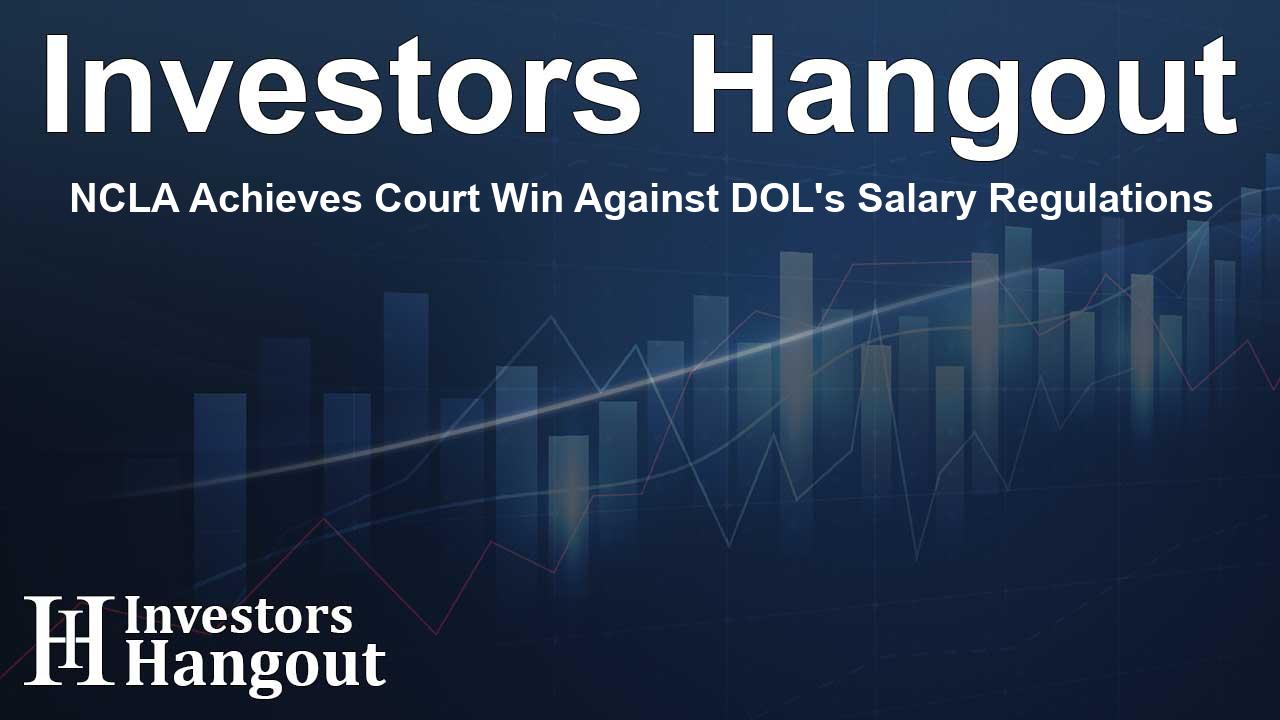NCLA Achieves Court Win Against DOL's Salary Regulations

NCLA Wins Legal Battle Against Department of Labor's Changes
The New Civil Liberties Alliance (NCLA) has successfully persuaded a federal court to halt the Department of Labor's (DOL) recent attempts to redefine wage and overtime exemptions for employees. This major ruling from the U.S. District Court for the Northern District of Texas marks a significant legal triumph for small businesses facing undue regulatory burdens.
The Case Overview
In a pivotal ruling regarding the case of Flint Avenue v. Department of Labor, the court granted summary judgment, declaring that the DOL had exceeded its statutory authority. A key aspect of the DOL's proposed rule was a substantial $58,656 minimum salary requirement for white-collar employees, which threatened to disrupt established exemptions under the Fair Labor Standards Act (FLSA).
Impact on Small Businesses
This minimum salary standard would have forced countless employers, including small businesses, to reevaluate their workforce classification. By limiting the exemption to only those who met the salary threshold, many white-collar employees would lose their status, thus undermining their current benefits, such as flexible work arrangements.
Defending Employee Flexibility
Flint Avenue, a small software company, illustrates the potential impact of this ruling. The company valued its ability to offer flexible working conditions, which included generous vacation policies. The DOL's regulation would have compelled Flint Avenue to categorize approximately five of its seven employees as hourly, removing the flexibility that was integral to its work culture.
Understanding the FLSA Exemptions
According to the FLSA, the exemptions apply to those employed in executive, administrative, or professional roles, focusing on employees’ duties rather than their salaries. However, the DOL's recent rule imposed a rigidity that sidelined the true essence of these exemptions. In effect, it mandated a fixed salary structure that did not align with the law’s original intent.
The Court's Rulings
Prior to this case, another U.S. District Court for the Eastern District of Texas ruled against the DOL's regulations in a separate case, confirming that Congress had not authorized the implementation of a minimum salary on all white-collar employees. This same logic was agreed upon by the Northern District, affirming the need for judicial intervention given the DOL's overreach.
Responses from NCLA Leaders
NCLA leadership lauded this victory as a crucial step in safeguarding the rights of small businesses and preserving essential employee benefits. Litigation Counsel, Sheng Li, remarked on how the ruling dismantled constraints imposed by the DOL's previous salary requirements, emphasizing the significance of flexibility for countless employees around the nation.
NCLA's Ongoing Mission
NCLA's commitment extends beyond this single case. This victory represents a broader initiative to challenge and reduce the unlawful overreach of administrative authorities. NCLA President, Mark Chenoweth, highlighted that it is Congress, not the DOL, that sets the foundation for such exemptions under the FLSA, reinforcing the importance of legislative intent in labor standards.
About NCLA
NCLA stands as a beacon for civil rights, striving to protect constitutional freedoms from government overreach. The organization, founded by legal scholar Philip Hamburger, remains steadfast in its mission of combating unlawful administrative power through public-interest litigation and advocacy efforts aimed at restoring fundamental rights for all Americans.
Frequently Asked Questions
What was the significance of the NCLA's recent court victory?
The victory halted the Department of Labor's attempts to impose a burdensome salary requirement on small businesses, preserving important exemptions.
How would the DOL's rule have impacted small businesses?
It would have forced many small business employees into hourly classifications, stripping away their flexible work schedules and benefits.
What does FLSA stand for?
The Fair Labor Standards Act, known as FLSA, governs minimum wage and overtime pay regulations in the United States.
Who is the founder of NCLA?
Philip Hamburger founded the New Civil Liberties Alliance to advocate for civil rights against government overreach.
What is the mission of NCLA?
NCLA's mission is to protect constitutional freedoms and combat unlawful power exercised by state and federal agencies.
About The Author
Contact Logan Wright privately here. Or send an email with ATTN: Logan Wright as the subject to contact@investorshangout.com.
About Investors Hangout
Investors Hangout is a leading online stock forum for financial discussion and learning, offering a wide range of free tools and resources. It draws in traders of all levels, who exchange market knowledge, investigate trading tactics, and keep an eye on industry developments in real time. Featuring financial articles, stock message boards, quotes, charts, company profiles, and live news updates. Through cooperative learning and a wealth of informational resources, it helps users from novices creating their first portfolios to experts honing their techniques. Join Investors Hangout today: https://investorshangout.com/
The content of this article is based on factual, publicly available information and does not represent legal, financial, or investment advice. Investors Hangout does not offer financial advice, and the author is not a licensed financial advisor. Consult a qualified advisor before making any financial or investment decisions based on this article. This article should not be considered advice to purchase, sell, or hold any securities or other investments. If any of the material provided here is inaccurate, please contact us for corrections.
